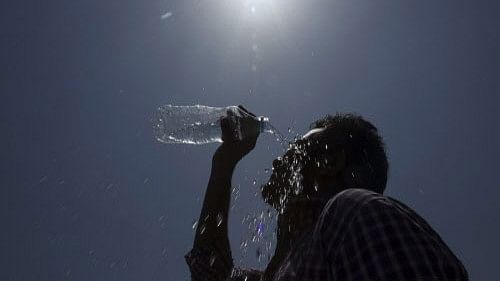
Representative image of a heatwave.
Credit: Reuters Photo
New Delhi: The national capital saw blistering heat on Tuesday as parts of Delhi singed, with temperatures soaring close to 50 degrees Celsius.
Hot winds from Rajasthan compounded people's misery due to the blazing sun in Delhi, leading to very high temperatures, especially in the outskirts. Heatwave conditions are expected to persist in Delhi for the next few days, according to the India Meteorological Department (IMD).
The city's Safdarjung observatory -- the official marker -- recorded its highest temperature on Tuesday, five notches above the seasonal average, at 45.8 degrees Celsius.
However, on the outskirts of the city, in Mungeshpur and Narela, 49.9 degrees Celsius was recorded, nine notches above normal on Tuesday. Najafgarh was recorded at 49.8 degrees Celsius, while Pitampura and Pusa recorded 48.5 degrees.
Explaining the reason behind the scorching heat, Mahesh Palawat, vice president of Meteorology and Climate Change at Skymet Weather, said: "In open areas with vacant land, there is increased radiation. Direct sunlight and lack of shade make these regions exceptionally hot." Palawat added, "When wind blows from the west, it affects these areas first. As they are on the outskirts, temperatures rise rapidly." Kuldeep Srivastava, the regional head of IMD, said the city's outskirts are the first areas to be hit by hot winds from Rajasthan.
"Parts of Delhi are particularly susceptible to the early arrival of these hot winds, worsening the already severe weather. Areas like Mungeshpur, Narela and Najafgarh are the first to experience the full force of these hot winds," he said.
Open areas and barren land are contributing to higher temperatures due to increased radiation, said IMD's Charan Singh.
Delhi has witnessed a steady rise in temperatures in the final days of May.
Tuesday's maximum temperature is slightly more than Sunday's when the national capital recorded 45.4 degrees Celsius.
On Tuesday, the national capital's Delhi Ridge recorded 47.5 degrees Celsius and Aya Nagar saw a high of 47.6 degrees Celsius, the IMD said, adding that this was a record high for these two stations.
The city is on a red alert for the next two days due to the prevailing heatwave conditions.
The IMD predicted mainly clear skies with heatwave conditions in many parts of Delhi and severe heatwave conditions in other areas, accompanied by strong and gusty winds on Wednesday.
The threshold for a heatwave is met when the maximum temperature of a weather station reaches at least 40 degrees Celsius in the plains, 37 degrees in the coastal areas, and 30 degrees in the hilly regions, and the departure from normal is at least 4.5 notches.
A severe heatwave is declared if the departure from normal exceeds 6.4 notches.
In a forecast released, the IMD has urged "extreme care for vulnerable people" due to the heatwave.
There is a very high likelihood of developing heat-related illness and heat stroke in people of all ages, and a significant health concern for vulnerable individuals such as infants, the elderly, and those with chronic diseases.
It has advised people to avoid exposure to heat and dehydration.
The weather department has also suggested drinking sufficient water and using ORS or homemade drinks such as lassi, 'torani' (rice water), lemon water and buttermilk to stay hydrated.
The Delhi government-run LNJP Hospital has been seeing a spike in the number of patients due to heatwave conditions.
"We have seen a high number of patients affected by the heat this week. Yesterday, alone, we received nearly 10 patients who were affected by heat stroke," said Dr Ritu Saxena from LNJP Hospital.
Symptoms like fever, headache, vomiting and unconsciousness are common. She also advised that people should avoid stepping out, especially during peak hours.
Delhi's relative humidity oscillated on Tuesday between 43 per cent and 17 per cent during the day.